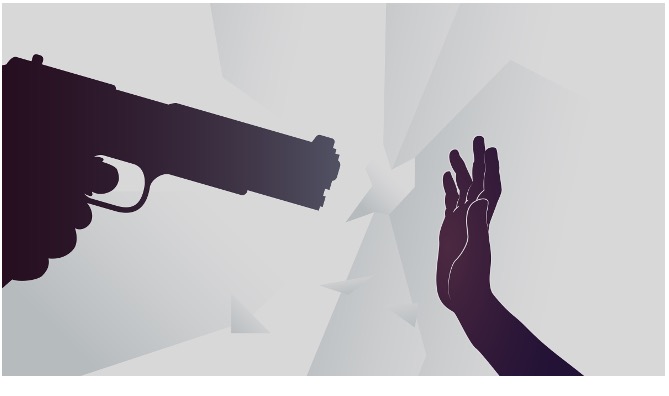Comments
ACCORDING TO LIZ - Last May, Salvador Ramos shot nineteen students and two teachers dead at Robb Elementary School in Uvalde.
Earlier this month five policemen brutally killed a man in Memphis.
And a little over a week ago a septuagenarian murdered eleven other seniors in Monterey Park.
What do these heinous acts have in common?
Not religion, not race. But power.
People died because others could kill them.
Why do Americans own guns? To protect themselves.
Against whom? Against others, people who don’t look like them. People who don’t act in ways that they believe people should act.
And to show that they are more powerful than the others. Be they Black, Native American, Muslim or women.
The intersection of race, gender, education, religion and violence exists all around the world.
And it is paired with a sense of elitism.
That the perpetrators have some right – politically or God-given, their skin color or a uniform – that makes them the arbiters of a twisted justice built on resentment.
They think they have authorization to exert unreasonable power by virtue of their own perception of themselves as righteous avengers. And the more that they get away with it, the more they are lauded by some sick elements of society in personal networks well-hidden from the rest of society but that these abusers are tuned into, the more that their “right” to torture and kill is reinforced.
And, ultimately, it is those perceived as the least powerful, those who have the least political support, those who appear to have the least ability to strike back at their tormentors, who are preyed upon.
Blacks, Chinese, Mexicans, women, and indigenous peoples.
Women and children are less likely to shoot back so are a safer target. Much of the violence against Native Americans takes place on reservations or in isolated attacks in multiethnic ghettoes.
Other races, followers of other religions, those who don’t speak English, become groups that are seen as having less political clout, more vulnerable to abuse, and less likely to draw outcry and steep penalties.
Although there is always an outcry and often severe penalties but, when caught and convicted, such reports may be less visible in the social media echo chambers of the perpetrators.
Meanwhile they bask in the adulation of their fellow power-junkies. And the sanctimonious tears of the do-nothing politicians who they see as surreptitiously endorsing such behavior.
What else feeds into the prevalence of this behavior?
The quintessential American cowboy image of taking justice into their own hands, access to guns and other weapons that allow men and, occasionally, women to feel more in control in what they perceive is a dangerous world, and the rise of fascism and dictatorships around the world enabling such overt abuse in Brazil and Hungry, Iran and the Philippines.
But contributing even more so is the lack of a sense of self-worth arising from the dearth of good jobs, the inability to support one’s family, the lack of access to quality healthcare and education – and the fancy cars and electronics advertised to all but affordable by only a few.
To address these issues would mean reshaping public sentiment to welcome progressive government programs that benefits everyone. Those trying to express their power through aggressive acts, too often see such proposals as just more giveaways to those whom they seek to oppress. Quite the conundrum.
Despite California having more restrictive gun laws, data from the Gun Violence Archive, shows our state had an average of 44 mass shootings per year between 2013 and 2021.
We added three more with Monterey Park, Half Moon Bay, and Oakland. In a ballroom dance studio, on a mushroom farm, and at a gas station being used for a music video.
Again, these shootings reflect a craving for power in those leading increasingly powerless lives.
Over 80% of shooters exhibit antisocial behaviors including agitation, aggression, and depression prior to acting out more violently, but their families and communities don’t have the resources to address the economic, social, and emotional provocations that drive their distress.
Why isn’t more being done given the level of family shootings and abuse in the United States?
Many of the social improvements that might help detox those striking out against others to assert a power they have not earned, are also those that will significantly reduce our homelessness crisis.
Healthcare for all, free quality education, building up good careers in our country not exporting them overseas, healing our land and purifying our water, breaking up monopolies so competition can flourish and America can be great again.
Instead of fomenting division and hatred, we need to embrace what makes people different, discover and celebrate other traditions, and learn how to love one another.
And assist in remaking all Americans into the image we would be proud to present to the rest of the world.
Let’s stop having to mourn murdered Americans and, rather than having those who feel unappreciated resort to violence to demonstrate their power, start finding constructive ways to ensure that all of us can take pride in ourselves.
(Liz Amsden is a contributor to CityWatch and an activist from Northeast Los Angeles with opinions on much of what goes on in our lives. She has written extensively on the City's budget and services as well as her many other interests and passions. In her real life she works on budgets for film and television where fiction can rarely be as strange as the truth of living in today's world.)







